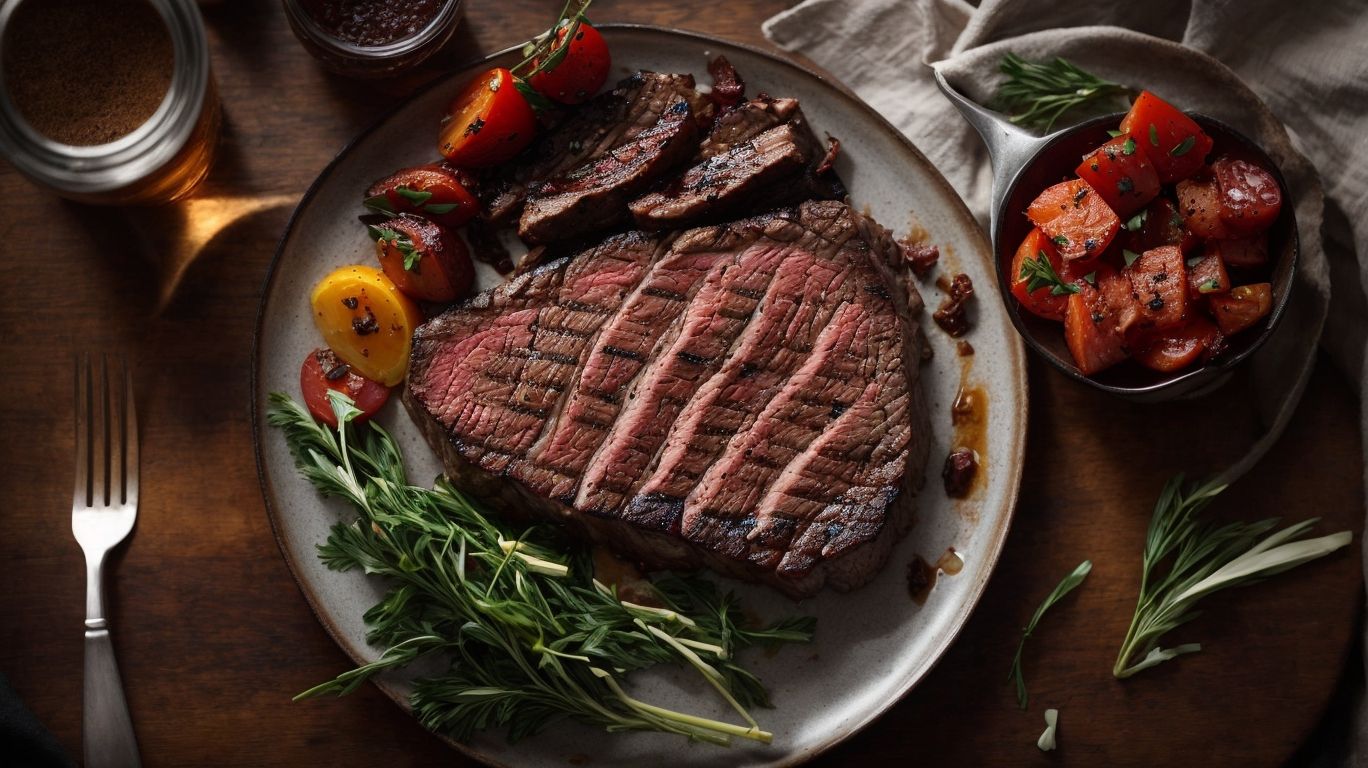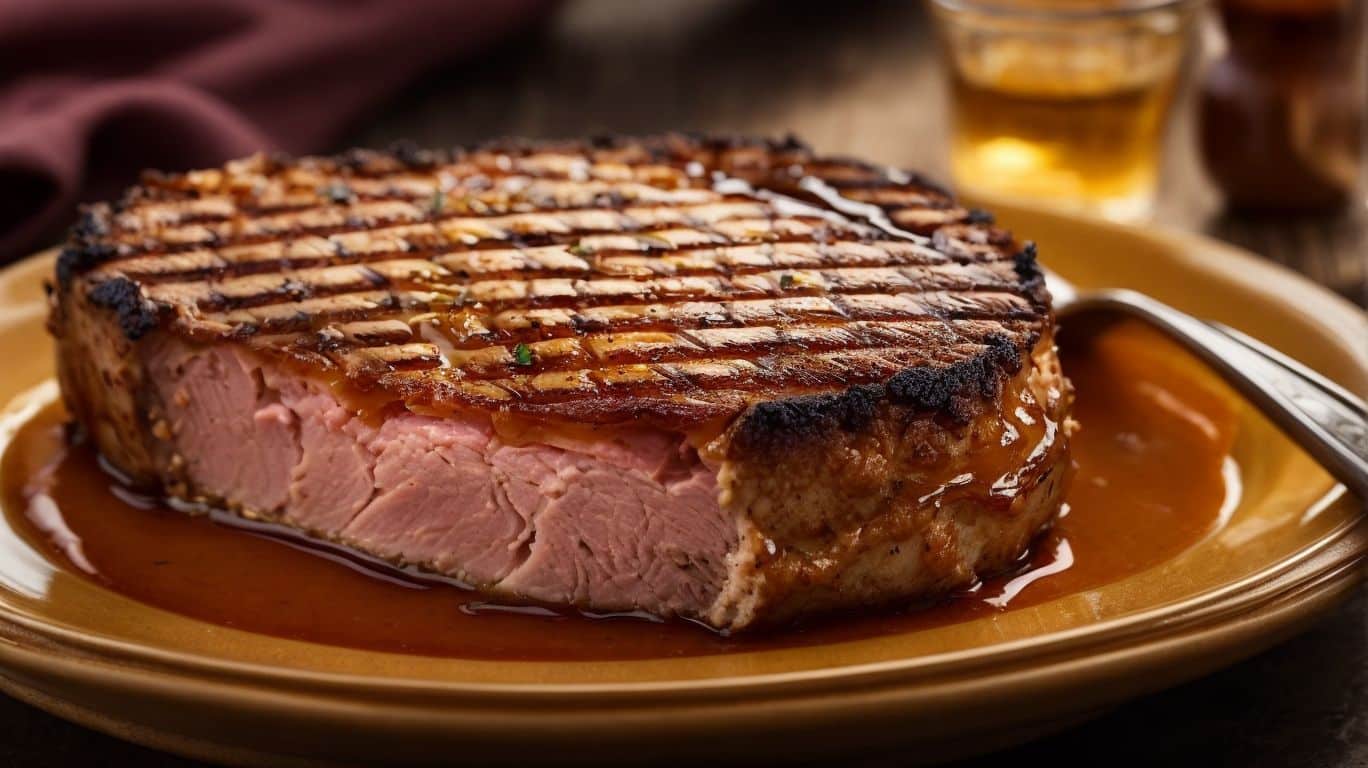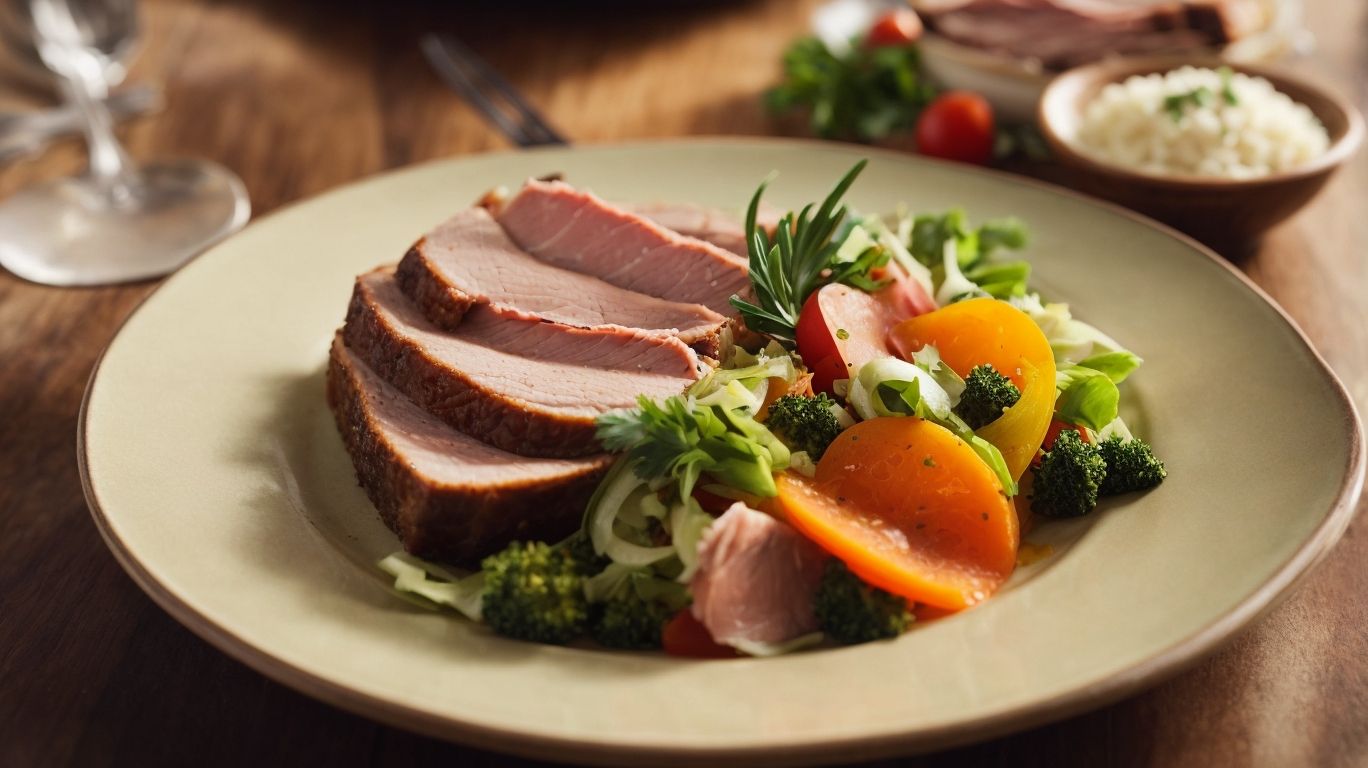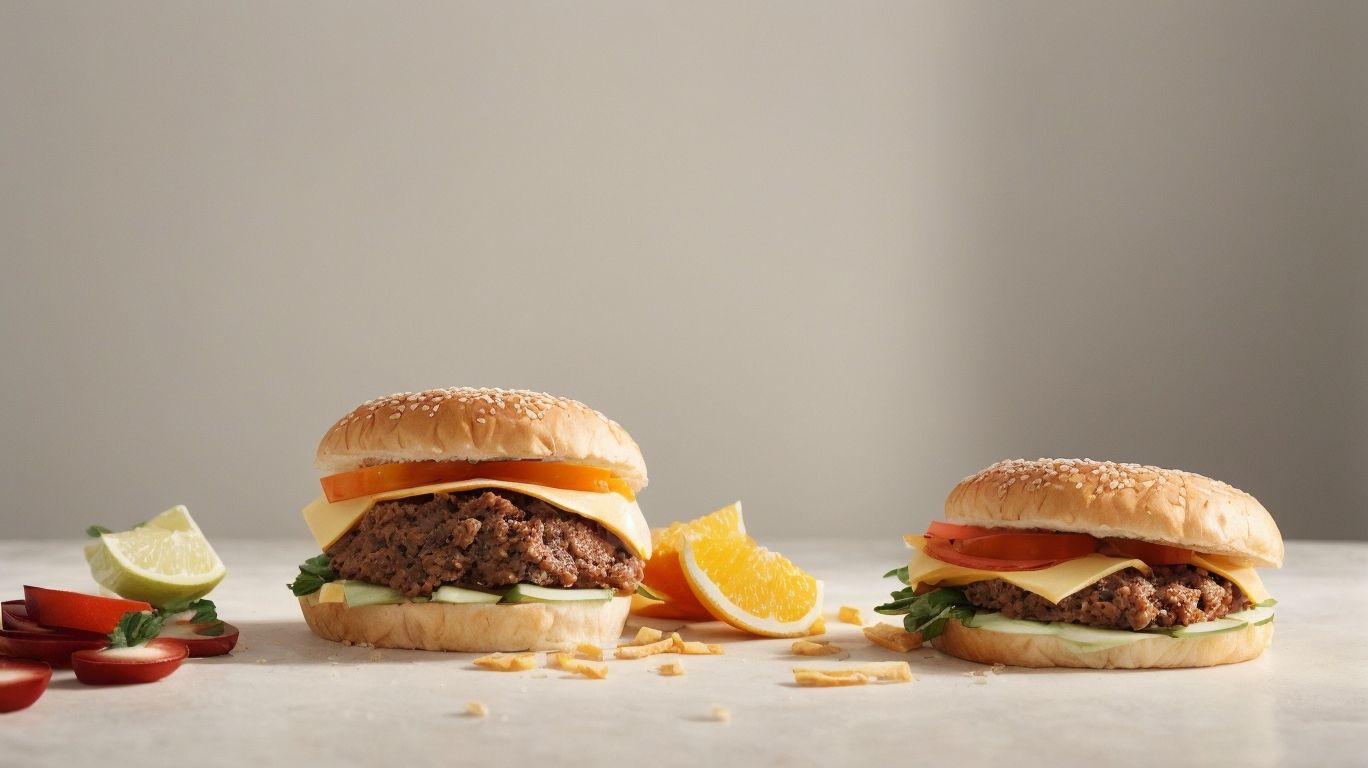“
When following a ketogenic diet, it is essential to understand the compatibility of different food items, including meats like ham. While ham is a popular choice for many, its keto-friendliness can be a subject of uncertainty. In this article, we will delve into the facts surrounding ham and its relationship with the keto diet.
To begin with, let’s understand what keto is. The ketogenic diet is a low-carb, high-fat diet that aims to put the body in a state of ketosis. This metabolic state allows the body to burn fat for fuel instead of carbohydrates.
Next, let’s explore what ham is. Ham is a type of preserved pork that is typically cured, smoked, or cooked. It is known for its distinct flavor and versatility, making it a common ingredient in various dishes.
Now, the question arises: is ham keto-friendly? To answer this, we need to look at several factors. Firstly, we will analyze the nutritional profile of ham, followed by its carbohydrate content and processing methods.
The nutritional profile of ham provides insights into its macronutrient composition, such as protein, fat, and carbohydrates. Examining the carbohydrate content is crucial for determining ham’s impact on blood sugar and ketosis. Finally, understanding the different processing methods and their compatibility with the keto diet is essential.
In the subsequent sections, we will discuss whether ham can be included in a keto diet, considering factors such as portion control, choosing the right type of ham, and pairing it with keto-friendly foods. We will also explore how ham may affect ketosis levels and the potential side effects of eating ham on a keto diet. Furthermore, alternatives to ham on a keto diet will be discussed.
By examining these aspects, you will gain a comprehensive understanding of whether ham can be a suitable and enjoyable addition to your ketogenic lifestyle.
“
Key takeaways:
- Ham can be included in a keto diet: While ham contains protein and fats, it’s important to choose the right type of ham and watch portion sizes to stay within keto macros.
- Watch out for hidden carbs in ham: Some types of ham may contain added sugars or fillers that can negatively impact ketosis, so check the labels for high-carb ingredients.
- Consider healthier alternatives: If ham doesn’t fit well into your keto diet, explore other options like lean meats, poultry, seafood, and vegetable-based protein sources.
What is Keto?

Photo Credits: Ieatketo.Com by Jose Walker
What is Keto? Keto, short for ketogenic, is a low carb, high-fat diet that has gained popularity for weight loss. It focuses on drastically reducing carbohydrate intake and replacing it with fats, causing the body to enter a metabolic state called ketosis. In ketosis, the body burns fat for energy instead of carbohydrates. This can lead to rapid weight loss and improved insulin sensitivity. It is important to note that keto is not suitable for everyone and should be done under medical supervision. It is also important to prioritize nutrient-dense, whole foods and stay hydrated. Consult a healthcare professional for personalized advice.
What is Ham?

Photo Credits: Ieatketo.Com by Carl Miller
What is Ham?
Ham is a type of preserved meat that is typically made from pork. What is Ham? It is commonly consumed all over the world and is known for its salty and smoky flavor. Ham can be enjoyed in various forms, such as sliced deli meat, ham steaks, or whole hams for roasting. It is usually cooked or smoked before being packaged and sold. The history of ham dates back centuries, with evidence of its consumption by ancient civilizations. In ancient China, for example, ham was considered a delicacy and was often offered as a tribute to emperors. Throughout history, ham has remained a popular and versatile meat choice.
Is Ham Keto-Friendly?

Photo Credits: Ieatketo.Com by Gary Garcia
Looking into the keto-friendliness of ham, we uncover various aspects that shed light on its compatibility with the diet. From exploring the nutritional profile and carbohydrate content of ham to understanding how processing methods play a role, we’ll delve into the facts and figures that determine whether ham can be a suitable choice for those following a keto lifestyle. Get ready to slice through the misconceptions and gain a clearer understanding of whether ham aligns with your keto goals.
The Nutritional Profile of Ham
Ham is a popular choice for meals, but it’s important to consider its nutritional profile when following a keto diet. Here is an overview of
| Nutrient | Amount per 100g |
|---|---|
| Calories | 145 |
| Protein | 18g |
| Fat | 7g |
| Carbohydrates | 1g |
| Sodium | 1040mg |
Ham is low in carbs, making it suitable for a keto diet. It is important to note that some types of ham may contain additives or higher sodium levels. To make healthier choices, opt for lean ham varieties without added sugars or fillers. Pairing ham with keto-friendly foods, such as leafy greens and low-carb vegetables, can create a balanced meal. It is advisable to watch portion sizes and consume ham in moderation to stay within your daily macronutrient goals on a keto diet.
Carbohydrate Content of Ham
The Carbohydrate Content of Ham
The carbohydrate content of ham can vary depending on the type and preparation method. Here is an overview of the approximate carbohydrate content of different types of ham:
| Ham Type | Carbohydrate Content per 100g |
| Fresh Ham | 0g |
| Cured Ham (unflavored) | 1-2g |
| Honey-Glazed Ham | 10-15g |
| Spiral-Cut Ham (with glaze) | 15-20g |
Pro-Tip: When incorporating ham into a keto diet, opt for fresh or unflavored cured ham with minimal carbohydrates. Be cautious with honey-glazed or spiral-cut ham, as they can significantly impact your carbohydrate intake. Always read the nutrition labels and consider portion sizes to maintain ketosis.
Processing Methods and Keto Compatibility
Processing methods and keto compatibility play a crucial role in determining the compatibility of ham with a keto diet. Here is a table that illustrates the impact of different processing methods on the keto-friendliness of ham:
| Processing Method | Keto Compatibility |
|---|---|
| Fresh | Fresh ham is highly compatible as it contains no additives or preservatives. |
| Uncured | Uncured ham is generally keto-friendly but may contain small amounts of sugar. |
| Sugar-cured | Sugar-cured ham is not recommended due to the high sugar content. |
| Smoked | Smoked ham can be keto-friendly if no sugar is added during the smoking process. |
| Pre-packaged/Processed | Pre-packaged or processed ham may contain additives, sugars, or fillers, making them less suitable for a keto diet. |
Considering the different processing methods is essential when including ham in a keto diet to ensure minimal carb intake and avoid unwanted additives.
Can You Include Ham in a Keto Diet?

Photo Credits: Ieatketo.Com by Austin Campbell
Ham lovers on a keto diet, this one’s for you! Let’s slice right through the facts and dive into the question, “Can you include ham in a keto diet?” We’ll explore the importance of portion control and moderation when indulging in ham, discover the right types of ham to choose for a keto-friendly journey, and even uncover some tantalizing options for pairing ham with other delicious keto-approved foods. So, get ready to savor the flavors while staying on track with your keto lifestyle!
Portion Control and Moderation
When incorporating ham into a keto diet, it’s crucial to practice portion control and moderation. To successfully follow a keto diet, it is essential to regulate the amount of ham consumed and exercise moderation.
While ham can be a tasty and convenient protein option, it’s important not to overindulge due to its high sodium content and potential additives. Although ham is a flavorful and convenient source of protein, it is vital to avoid excessive consumption due to its elevated sodium levels and potential additives.
Stick to recommended serving sizes, which are typically 2-3 ounces. Adhering to the recommended serving sizes, typically ranging from 2-3 ounces, is highly recommended.
Opt for leaner varieties of ham, such as low-sodium or nitrate-free options. It is advisable to select leaner types of ham, including low-sodium or nitrate-free options.
Pairing ham with keto-friendly foods like vegetables or avocado can help balance out the meal. Combining ham with keto-friendly foods like vegetables or avocado can contribute to a well-balanced meal.
Remember, moderation is key to maintaining ketosis and staying on track with your goals. Always keep in mind that moderation plays a crucial role in sustaining ketosis and aligning with your goals.
Pro-tip: To ensure portion control, pre-portion your ham into individual servings before storing in the fridge. This makes it easier to grab the right amount when preparing your keto meals. An additional tip for effective portion control is to pre-portion the ham into individual servings before refrigerating. This practice simplifies the process of obtaining the appropriate amount while preparing your keto meals.
Choosing the Right Type of Ham
When it comes to choosing the right type of ham for a keto diet, it is essential to consider a few factors. First and foremost, prioritize opting for unprocessed or minimally processed ham. By doing so, you will definitely be consuming fewer additives and carbohydrates. Another important factor to take into account is selecting ham that is nitrate-free and contains minimal sodium. Ideally, if you have the opportunity, opt for organic or pasture-raised ham as it is a healthier option. Additionally, it is crucial to check the nutritional label to ensure that the ham aligns with your macronutrient goals. It should have low or no added sugars or fillers. Remember, the right type of ham plays a crucial role in maintaining ketosis and achieving your desired health goals.
Pairing Ham with Keto-friendly Foods
Pairing ham with keto-friendly foods is a great way to create a nutritious and satisfying meal that aligns with the principles of a ketogenic diet. Here are some fantastic ideas to consider:
- For a quick and low-carb snack, you can wrap slices of ham around delicious avocado or refreshing cucumber.
- You can also make a mouthwatering ham and cheese omelette using keto-friendly cheeses like cheddar or feta.
- Another option is to prepare a flavorful ham and vegetable stir-fry using low-carb vegetables such as bell peppers, zucchini, and broccoli.
- If you prefer a light and refreshing meal, a ham and spinach salad topped with a delightful olive oil and vinegar dressing would be perfect.
- For a more indulgent treat, you can use ham as a delicious topping for cauliflower crust pizza or enjoy it in a lettuce wrap with creamy mayonnaise and tangy mustard.
Please make sure to check the nutritional information of the ham and other ingredients to ensure they fit within your keto macros. Enjoy your keto-friendly ham creations!
Ham and Ketosis

Photo Credits: Ieatketo.Com by Michael Jones
Curious about the relationship between ham and ketosis? In this section, we’ll uncover the impact of ham on ketosis levels and explore the effect different ham varieties can have on this metabolic state. We’ll touch on the effects of sodium and additives in relation to ketosis. Get ready to slice through the facts and discover the truth about ham in the world of ketosis!
Impact on Ketosis Levels
Including ham in a keto diet can have an impact on ketosis levels. Here are some factors to consider:
1. Sodium and additives: Some types of ham may have a significant effect on ketosis levels due to their high sodium and additives content. It is recommended to search for low-sodium options and carefully read product labels.
2. Nitrites and nitrates: The presence of nitrites and nitrates in ham can be concerning for individuals following a keto diet. To mitigate this, it is advisable to choose nitrite-free or uncured ham whenever possible.
3. Protein content: Although ham is a good source of protein, excessive consumption can potentially disrupt ketosis. It is crucial to be mindful of overall protein intake and ensure a balanced ratio of fats and carbs.
4. Processed vs. fresh ham: Processed ham, like deli ham, often contains added sugars or fillers that can negatively impact ketosis. Therefore, it is preferable to opt for fresh, unprocessed ham whenever available.
5. Serving size: Proper portion control plays a vital role in a keto diet. Adhering to recommended serving sizes for ham is essential to prevent an excessive carb intake.
Remember, the impact on ketosis levels may vary based on individual factors and the specific type and preparation of the ham. It is always best to seek personalized advice and guidance from a healthcare professional or registered dietitian.
Ham Varieties and their Effect on Ketosis
Different varieties of ham can have varying effects on ketosis levels due to differences in their nutritional composition. Here is a table showcasing some common ham varieties and their effect on ketosis:
| Ham Variety | Effect on Ketosis |
|---|---|
| Honey Ham | High carb content, may hinder ketosis |
| Black Forest Ham | Low carb content, compatible with ketosis |
| Smoked Ham | Low carb content, compatible with ketosis |
| Country Ham | Low carb content, compatible with ketosis |
When incorporating ham into a keto diet, it is essential to consider portion control and moderation. Opt for ham varieties with lower carbohydrate content to remain in ketosis. It is important to be cautious of sodium and additives in processed hams, as they may have negative health effects. If ham is not suitable for your keto diet, you can consider alternatives like turkey or chicken.
Effects of Sodium and Additives
The effects of sodium and additives in ham can have significant implications for individuals following a keto diet.
- Sodium: It is important to note that many types of ham contain high levels of sodium. This excessive sodium intake can lead to water retention and increased blood pressure, which can be problematic for those on a keto diet. This is because individuals on a keto diet aim to maintain proper electrolyte balance, and high levels of sodium can disrupt this balance.
- Additives: Another consideration when it comes to ham is the presence of additives. Processed hams often contain additives such as sugars, fillers, and preservatives. These additives can contribute to increased carbohydrate content in the ham, potentially disrupting ketosis. Therefore, individuals on a keto diet should be mindful of the additives present in the ham they consume.
- Choosing wisely: To mitigate the negative effects of sodium and additives in ham, it is advisable to opt for low-sodium or nitrate-free ham options whenever possible. Additionally, individuals following a keto diet should look for natural, minimally processed varieties of ham that are free from additives. Making these wise choices can help maintain the desired state of ketosis while enjoying a ham-based meal.
Possible Side Effects of Eating Ham on a Keto Diet

Photo Credits: Ieatketo.Com by Henry Campbell
Eating ham on a keto diet can have potential side effects that you should be aware of.
- High sodium content: Ham is often cured with salt, making it high in sodium. Consuming excessive sodium can lead to water retention and increased blood pressure.
- Processed meat: Ham is considered processed meat and may contain additives, preservatives, and nitrates that can be detrimental to health in the long term.
- Hidden sugars: Some store-bought hams may contain added sugars, which can disrupt ketosis and hinder weight loss.
- Limited nutrient profile: While ham can be a good source of protein, it lacks the variety of nutrients found in other meats like beef or chicken.
Since the Paleo era, ham has been a popular food choice. Ancient civilizations, such as the Greeks and Romans, enjoyed ham for its rich flavor and long shelf life. In more recent times, ham has become a staple dish during festive holidays like Easter and Christmas.
Possible Side Effects of Eating Ham on a Keto Diet
- Eating ham on a keto diet can have potential side effects that you should be aware of.
- High sodium content: Ham is often cured with salt, making it high in sodium. Consuming excessive sodium can lead to water retention and increased blood pressure.
- Processed meat: Ham is considered processed meat and may contain additives, preservatives, and nitrates that can be detrimental to health in the long term.
- Hidden sugars: Some store-bought hams may contain added sugars, which can disrupt ketosis and hinder weight loss.
- Limited nutrient profile: While ham can be a good source of protein, it lacks the variety of nutrients found in other meats like beef or chicken.
Since the Paleo era, ham has been a popular food choice. Ancient civilizations, such as the Greeks and Romans, enjoyed ham for its rich flavor and long shelf life. In more recent times, ham has become a staple dish during festive holidays like Easter and Christmas.
Alternatives to Ham on a Keto Diet

Photo Credits: Ieatketo.Com by Adam Williams
- Alternatives to Ham on a Keto Diet can provide variety and help meet dietary needs.
- Turkey: A lean and protein-packed alternative to ham.
- Prosciutto: A cured Italian meat with a high-fat content and no carbohydrates.
- Salmon: A fatty fish rich in omega-3 fatty acids and low in carbs.
- Chicken: A versatile option that can be cooked in various ways to suit different dishes.
- Mushrooms: A vegetarian option that can be grilled or sautéed for a meaty texture.
Some Facts About “Is Ham Keto? Slicing Through the Facts”:
- ✅ Ham is a suitable meat option for those following a ketogenic diet, as long as it is not glazed in sugar. (Source: Our Team)
- ✅ The natural state of ham is ideal for a keto diet, as it is a meat with no carbs and high in fat. (Source: Our Team)
- ✅ Deli hams should be avoided on a keto diet, as they are often cured with sugar and other non-keto friendly ingredients. (Source: Our Team)
- ✅ Mustard can be used as a condiment with ham on a keto diet, but sweet mustards like honey mustard should be avoided. (Source: Our Team)
- ✅ Checking labels when buying sliced deli ham is recommended to ensure it is keto-friendly. (Source: Our Team)
Frequently Asked Questions
Is ham keto-friendly?
Yes, ham is a suitable meat option for those following a ketogenic diet, as long as it is not glazed in sugar. The natural state of ham is ideal for a keto diet, as it is a meat with no carbs and high in fat.
Can I use mustard on keto ham?
Yes, mustard can be used as a condiment on keto ham. However, sweet mustards like honey mustard should be avoided, as they contain sugars that are not keto-friendly.
Can I eat deli hams on a keto diet?
Deli hams should be avoided on a keto diet, as they are often cured with sugar and other non-keto friendly ingredients. It is recommended to check the label when buying sliced deli ham to ensure it is keto-friendly.
What are the nutritional facts of deli sliced ham?
Deli sliced ham contains 181 calories per serving size of 21 slices, which is about 195 grams. It has 5 grams of total fat, 1 gram of saturated fat, and 0 grams of trans fat. The cholesterol content is 104 milligrams, and the sodium content is 2336 milligrams. It has 3 grams of total carbohydrates and 0 grams of dietary fiber. The ham is high in protein, with 31 grams per serving.
Is deli sliced ham low in calories?
Yes, deli sliced ham is considered to have a low calorie density, with 86 calories per 100 grams. This means that you can consume a larger amount of this food with fewer calories, making it a good choice for those on a diet.
What are some keto-friendly alternatives to deli sliced ham?
Some keto-friendly alternatives to deli sliced ham include black forest ham, catfish with no fat added, smoked salmon (lox), sole fish, canned chicken breast, Subway turkey, deli chicken breast, turkey pastrami, and deli sliced turkey. These foods have a high similarity in macronutrient composition and can be enjoyed on a keto diet.


